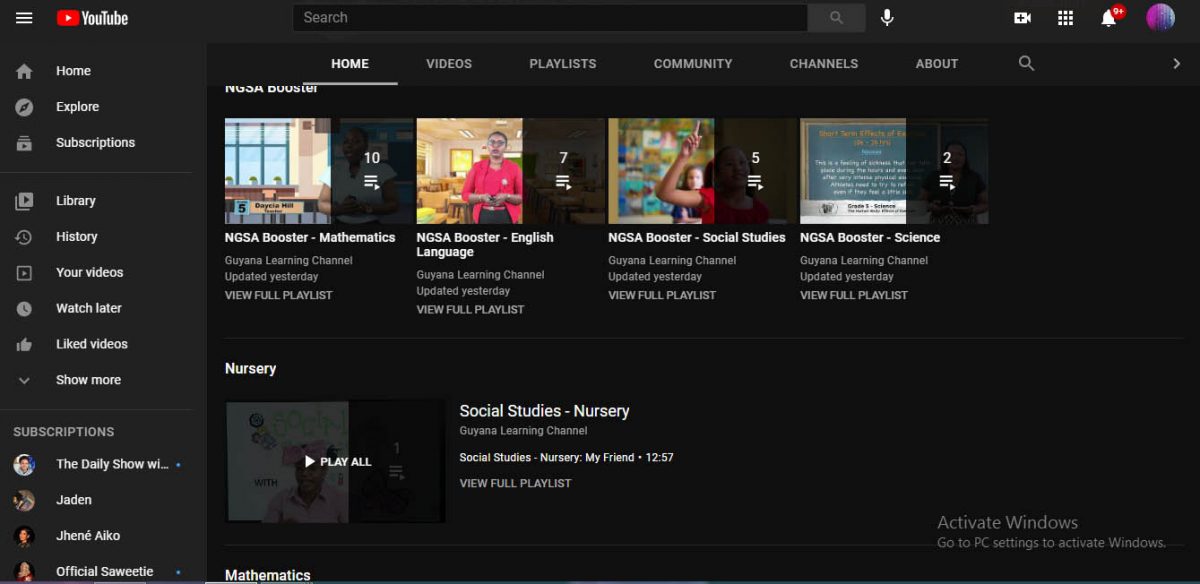With the National Grade Six Assessment (NGSA) expected to be administered on August 4 and 5, the Ministry of Education has developed a booster programme to prepare students for the exams.
The launch of the programme was held yesterday at the National Centre for Educational Resource Development (NCERD), in Kingston, Georgetown, where the Minister of Education, Priya Manickchand said efforts are underway to ensure access across the country.
The programme was developed by the ministry in collaboration with its Guyana Learning Channel (GLC) department. Head of Guyana Learning Channel, Anieshaw Mohamed, who spearheaded the idea which was conceptualised by the Minister, said that the programme was developed by use of consolidated information and themes which would be attractive to students so they could focus and be able to learn better through the video broadcasts. The objective of the programme, she said, is to engage students through a replicated online version of the classrooms and locally trained teachers are the persons who will be teaching in the videos so that students may be familiarised with the language and way in which the teachers will provide the information.
The programmes will be aired on the GLC daily from 10:30 am to 3 pm on weekdays, with rebroadcasts at 5pm to 7pm, and on weekends from 9 am to 5pm for full rebroadcasts. They are also available on the GLC YouTube channel (https://www.youtube.com/channel/UCiLHDXgCNJM0xXtBCpfhCyg).
Manickchand explained that the purpose for developing the programme was so that the Grade Six students can be psychologically and mentally prepared for the exams. “We don’t want our Guyanese babies going into a room and feeling so heavily unprepared for this exam,” she said.
She noted that the ministry initially started providing extra learning equipment to students during the pandemic through the use of worksheets, which were for hinterland and riverine students. However, the ministry soon realised that these worksheets were also needed by students outside of these areas due to lack of internet access across the country. She said that it was for this reason the ministry has used various means to tackle the inaccessibility to learning materials by use of radio, television and print materials.
Usually, topics for the exams are often pulled from Grade One to Grade Six work, however, this year the students will only be tested on work done from Grade One to Grade Five, Manickchand added. She said that of the usual 40 weeks’ worth of curriculum work, only 20 weeks’ worth of selected topics, which have been chosen to fill the curriculum, will be on the exam papers. But the programme itself will only carry the work from the 20 weeks’ curriculum and topics which are often pulled from Grade Four and have been repeated questions on the NGSA examination. Manickchand said students will be fully prepared for the exams this way.
It is for this reason, the Minister said, that a similar programme is being developed for the students who will be sitting Caribbean Examinations Council exams in June-August. She disclosed that the ministry is preparing a similar set of aids for those students with the use of the general topics which were shared by CXC over the past weekend. The minister emphasised, however, that the boosters will not be a replacement for the face-to-face learning. She noted that the ministries of Health and Education are not certain when students and teachers will be able to return to school but keeping in mind that last year’s preparations for the exams and this years’ are different because of the very distinct circumstances, the students may very well not be required to return to school prior to the exam dates. She told this newspaper that last year students were thrown into the exam without completing most of the curricula but that this year they were able to complete most of last years’ topics so they are better prepared.
However, there may be difficulties getting the programme in places where there is little or no access to television and internet but Manickchand assured that her ministry is working towards having this challenge rectified. “We are in the process right now of purchasing televisions, solar systems and satellite for every single hinterland, riverain community. Right now we have nine, so places like… Waramadong, Moco Moco, Aishalton, Kaikan, Paruima and Kamarang [have access].” She indicated that works are underway to have the same done in Moraikobai and an audit is being done to see which communities do not have satellites. She also noted that in some instances, places have television but no satellite, while there are instances where one person has a television set in the area and children can access the programmes through that television. In such an instance, the ministry will work out a way to have the programmes sent to the owner of the set and have the work plugged in via flash drives if need be.






